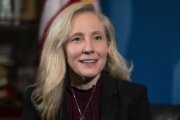JILL LAWLESS
Associated Press
CLACTON-ON-SEA, England (AP) — An invasion is descending on the tidy bungalows, fish-and-chip shops and amusement arcades along England’s eastern flank, and support is surging for a party of upstart anti-Europeans.
The U.K. Independence Party is finding a warm welcome in this seaside town for its promise to curb immigration and leave the European Union. But the invasion washing up here isn’t from across the water — it’s an army of UKIP supporters from around the country, flocking to Clacton-on-Sea to help the party make an electoral breakthrough that could change the face of British politics.
Barring a staggering upset, the party once dismissed by Prime Minister David Cameron as a bunch of “fruitcakes and loonies and closet racists” will gain its first elected British lawmaker in a special election Thursday — and he probably won’t be the last.
“I’ve never experienced this kind of excitement for politics,” said Douglas Carswell, the party’s ebullient Clacton candidate. He was a Conservative legislator for nine years before defecting to UKIP in August and asking voters to back his decision.
“I had an 11-year-old schoolgirl make a rap video,” Carswell said as he visited a storefront campaign office full of busy volunteers. “I’ve had pensioners coming over from (nearby town) Frinton on the bus to deliver leaflets.”
There is a definite buzz around UKIP in Clacton. The party’s purple-and-yellow posters are plastered all over town. Volunteers have come from as far away as Scotland to help in the campaign, to the delight of longtime members.
“It’s a tidal wave,” said John Moore, a party member since 1997. “We’re the party of the future. People are fed up with the political class.”
Like other populist parties across Europe, UKIP is becoming a magnet for the angry and the left-behind. It draws support from older voters and those who feel marooned by Britain’s transformation in recent decades from an industrial powerhouse to a service-sector economy with a multicultural population.
Political scientist Matthew Goodwin, co-author of the book “Revolt on the Right,” says UKIP is finding fertile ground in Clacton and other places in “the struggling coastal eastern half of England.”
Long a seaside getaway for Londoners, Clacton’s fortunes declined when Britons began taking cheap holidays abroad. Today the town 80 miles (130 kilometers) northeast of the British capital is home to large numbers of retirees, many of whom moved from London in search of more space, cheaper housing and — in some cases — a less varied cultural mix.
Political talk here often turns to immigration, especially the influx of Romanians and Bulgarians since those countries joined the EU.
“We’ve had more crime over here since the Romanians came in,” said retiree Anthony Wilson, enjoying the sunshine on Clacton’s pier.
“The bottom line is, you don’t feel as if you’re in England,” added his wife Dianne. “You hear so many languages you don’t feel like you’re home.”
Senior UKIP members say the party is not racist and seeks to control immigration rather than end it. Carswell, 43, says he abhors racism and has adorned the walls of his campaign headquarters with pictures of Mahatma Gandhi and reforming Victorian Prime Minister William Gladstone.
He insists UKIP is a positive force, “not an angry reaction against modernity.”
The party is eager to show it is about more than Europe and immigration. Its message to voters in Clacton focuses firmly on local issues: keeping a local maternity unit open, hiring more doctors, reversing a local-authority decision to turn off streetlights to save money.
UKIP’s supporters are drawn by its claim to be a radical alternative to what Carswell calls the “cliques” that run the mainstream parties.
It’s a message that goes down well in Clacton’s more prosperous neighborhoods, but UKIP faces a bigger challenge in places like Jaywick, a couple of miles west of town. A cluster of potholed laneways lined with tiny bungalows, built as holiday homes but now permanently occupied, it has been ranked the most deprived community in the country in government figures.
Here, UKIP’s claim to be different from other political parties is regarded with suspicion.
“It’s a lot of false promises,” said resident Coralina Cattrell, growing vegetables on an abandoned plot of land.
Despite the skepticism of some voters, polls suggest Carswell will win Thursday’s election in a landslide to give UKIP its first elected British lawmaker. (Despite its Euroskepticism, it has 24 seats in the European Parliament).
Next month a second Conservative defector, Mark Reckless, will seek re-election under the UKIP banner.
The party plans to run scores of candidates in a national election in May. Nigel Farage, the party’s garrulous, beer-drinking leader, is one of several with a good chance of being elected.
Britain’s first-past-the-post electoral system means UKIP could struggle to translate voter support into a large number of House of Commons seats, but Goodwin says the mainstream parties — Conservative, Labour and Liberal Democrat — should be worried.
“This time last year the consensus was UKIP would not win a seat in Parliament,” he said. “That is about to happen. It may be we have consistently underestimated this party.”
___
Follow Jill Lawless on Twitter at http://Twitter.com/JillLawless
Copyright 2014 The Associated Press. All rights reserved. This material may not be published, broadcast, rewritten or redistributed.







